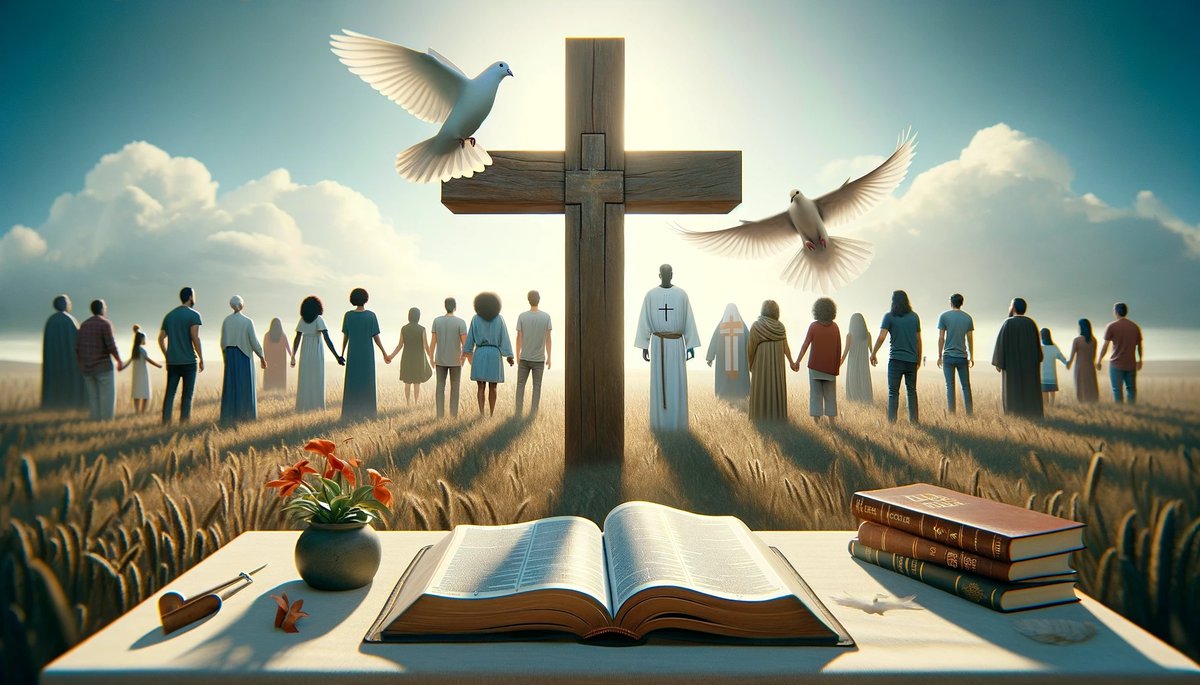Home>Theology and Spirituality>What Does Southern Baptist Believe


Theology and Spirituality
What Does Southern Baptist Believe
Published: February 21, 2024
Jason DeRose, Managing Editor at Christian.net, uses his expertise in religion and journalism to deepen understanding of faith's societal impacts. His editorial leadership, coupled with a strong academic background, enriches the platform’s diverse content, earning him recognition in both journalism and religious circles.
Discover the core beliefs of Southern Baptists and their theology and spirituality. Explore their faith and doctrine in depth.
(Many of the links in this article redirect to a specific reviewed product. Your purchase of these products through affiliate links helps to generate commission for Christian.net, at no extra cost. Learn more)
Table of Contents
Introduction
The Southern Baptist Convention (SBC) is one of the largest Christian denominations in the United States, known for its conservative theological stance and evangelical mission. With a rich history dating back to the 19th century, the SBC has played a significant role in shaping American Christianity and culture. Understanding the beliefs and principles that underpin the Southern Baptist faith provides valuable insight into the denomination's identity and impact.
As we delve into the core tenets of Southern Baptist beliefs, it's essential to recognize the diverse tapestry of individuals and congregations that comprise this denomination. While there is a shared commitment to certain theological doctrines and practices, Southern Baptists encompass a wide spectrum of cultural, social, and theological expressions. This diversity reflects the dynamic nature of the SBC and its ability to adapt to changing societal landscapes while remaining rooted in its foundational beliefs.
Exploring the beliefs of Southern Baptists offers a glimpse into their approach to spirituality, community, and engagement with the world. From their views on salvation and the Bible to their stance on social issues and church leadership, the theological framework of the SBC informs and guides the faith and practices of its members. By examining these foundational elements, we gain a deeper understanding of the Southern Baptist tradition and its enduring influence on both the religious and secular spheres.
In the following sections, we will embark on a journey through the history, theology, and key beliefs of the Southern Baptist Convention. By navigating the theological landscape of the SBC, we aim to illuminate the core principles that shape the faith and identity of Southern Baptists, shedding light on their convictions and contributions to the broader tapestry of Christian faith in America.
Read more: What Southern Baptist Believe About Baptism
History of Southern Baptist Beliefs
The history of Southern Baptist beliefs is deeply intertwined with the broader narrative of American Christianity. The roots of the Southern Baptist Convention can be traced back to the early 17th century when English Separatists and Puritans sought religious freedom in the New World. Over the centuries, various theological and ideological currents shaped the landscape of American Protestantism, laying the groundwork for the emergence of the Southern Baptist tradition.
The 19th century witnessed significant developments that would ultimately lead to the formation of the Southern Baptist Convention. The institution of slavery and the ensuing Civil War profoundly impacted the religious and social fabric of the Southern states. As a result, Baptists in the South began to coalesce around their distinct theological and cultural identity, setting the stage for the formal establishment of the SBC in 1845.
Central to the early beliefs of Southern Baptists was a commitment to the autonomy of local churches and the authority of the Bible. This emphasis on congregational independence and scriptural fidelity reflected a desire to preserve the core tenets of Baptist faith while navigating the tumultuous social and political realities of the era.
The late 19th and early 20th centuries witnessed a period of theological consolidation and institutional growth within the Southern Baptist Convention. The adoption of the Baptist Faith and Message in 1925 and its subsequent revisions in 1963 and 2000 solidified key doctrinal positions on topics such as the Trinity, salvation, and the authority of Scripture. These doctrinal statements served to articulate and codify the theological convictions that undergird Southern Baptist beliefs, providing a framework for unity and cooperation among member churches.
The history of Southern Baptist beliefs is also marked by a commitment to evangelism and missions. From the establishment of the Foreign Mission Board in 1845 to the expansive global outreach efforts of the International Mission Board today, Southern Baptists have been steadfast in their dedication to spreading the Christian message both domestically and internationally.
As the SBC navigates the complexities of the modern era, its historical trajectory continues to inform and shape its beliefs. The dynamic interplay between tradition and adaptation underscores the ongoing evolution of Southern Baptist beliefs, reflecting a commitment to engaging with contemporary challenges while remaining rooted in the enduring principles that have defined this influential Christian denomination.
Theology and Doctrine
The theology and doctrine of the Southern Baptist Convention (SBC) are deeply rooted in a conservative evangelical framework that emphasizes the authority of the Bible, the centrality of Jesus Christ, and the necessity of personal faith in salvation. At the heart of Southern Baptist theology is a commitment to the foundational beliefs articulated in the Baptist Faith and Message, a doctrinal statement that outlines key theological convictions.
Central to Southern Baptist theology is the belief in the Triune God—Father, Son, and Holy Spirit—as revealed in the Scriptures. This Trinitarian understanding forms the bedrock of SBC's theological framework, shaping its understanding of God's nature and relationship with humanity. Additionally, Southern Baptists affirm the deity of Jesus Christ, viewing Him as the unique Son of God and the sole mediator between God and humanity.
The doctrine of salvation occupies a pivotal role in Southern Baptist theology, underscoring the conviction that salvation comes through faith in Jesus Christ alone. This emphasis on individual faith and personal conversion aligns with the evangelical tradition, reflecting a deep-seated commitment to sharing the message of redemption with others.
Furthermore, the SBC upholds the authority and inerrancy of the Bible, regarding it as the inspired and infallible Word of God. This high view of Scripture informs Southern Baptist theology and serves as the ultimate source of guidance for matters of faith and practice.
In the realm of ecclesiology, Southern Baptist theology emphasizes the autonomy of the local church, affirming the self-governing nature of individual congregations. This commitment to congregational independence is coupled with a cooperative spirit that fosters collaboration and mutual support among member churches.
The theological landscape of the Southern Baptist Convention also encompasses beliefs related to eschatology, ethics, and spiritual formation, providing a comprehensive framework for understanding the Christian life and mission.
In essence, the theology and doctrine of the Southern Baptist Convention reflect a robust evangelical perspective that underscores the primacy of Scripture, the centrality of Jesus Christ, and the imperative of sharing the message of salvation. These theological convictions continue to shape the identity and mission of the SBC, guiding its engagement with contemporary issues and its enduring commitment to the proclamation of the gospel.
Views on Salvation
Salvation holds a central position in the theological framework of the Southern Baptist Convention (SBC), embodying a profound significance that shapes the beliefs and practices of its members. At the core of Southern Baptist views on salvation is the conviction that salvation is attainable solely through personal faith in Jesus Christ. This emphasis on individual faith and the transformative power of the gospel underscores the evangelical orientation of the SBC.
Southern Baptists affirm the biblical teaching that all humanity is in need of salvation due to the reality of sin. This foundational understanding aligns with the broader Christian doctrine of original sin and the universal need for redemption. Within the SBC, the concept of salvation is intricately linked to the atoning work of Jesus Christ, who, through His sacrificial death and resurrection, offers the pathway to reconciliation with God.
The process of salvation, as understood within Southern Baptist theology, centers on the belief that individuals are called to respond to the gospel message through faith and repentance. This response involves acknowledging one's sinfulness, embracing Jesus Christ as Savior and Lord, and committing to a life of discipleship. The act of conversion, marked by a personal decision to follow Christ, is regarded as the pivotal moment of salvation in the Southern Baptist tradition.
Moreover, Southern Baptists emphasize the eternal significance of salvation, viewing it as a transformative experience that not only secures one's relationship with God in the present life but also ensures the hope of eternal life in the presence of God. This eschatological dimension of salvation underscores the enduring impact of the gospel and the promise of redemption for believers.
The evangelical zeal of the SBC is evident in its unwavering commitment to sharing the message of salvation with others. Evangelism, rooted in the belief that salvation is available to all who respond to the gospel, occupies a central place in Southern Baptist identity and mission. This fervent dedication to proclaiming the good news reflects the conviction that salvation is a universal invitation extended to all humanity.
In summary, Southern Baptist views on salvation encapsulate a robust evangelical perspective that underscores the transformative power of the gospel, the necessity of personal faith in Christ, and the universal scope of God's redemptive offer. These beliefs continue to animate the faith and mission of the SBC, shaping its engagement with individuals, communities, and the broader world as it seeks to share the message of salvation with unwavering conviction and compassion.
Views on Baptism
Baptism holds a significant place within the theological framework of the Southern Baptist Convention (SBC), embodying a profound symbolic and spiritual significance that reflects the beliefs and practices of its members. Central to Southern Baptist views on baptism is the understanding that it is a public declaration of one's faith in Jesus Christ and a symbolic representation of the believer's identification with Christ's death, burial, and resurrection.
Southern Baptists adhere to the practice of believer's baptism, which emphasizes that individuals should be baptized only after making a personal profession of faith in Jesus Christ. This conviction aligns with the broader Baptist tradition, which emphasizes the voluntary and conscious decision of individuals to embrace the Christian faith before undergoing baptism. The act of baptism is viewed as an outward expression of an inward transformation, signifying the believer's union with Christ and participation in the community of faith.
Furthermore, Southern Baptists emphasize the mode of baptism, typically practicing immersion as the preferred method. Immersion baptism, wherein the individual is fully submerged in water, is regarded as a vivid portrayal of the believer's identification with Christ's death, burial, and resurrection. This mode of baptism symbolizes the believer's spiritual cleansing, renewal, and participation in the redemptive work of Christ, underscoring the transformative nature of the Christian faith.
The significance of baptism within the SBC extends beyond its individual and symbolic dimensions to encompass communal and ecclesial implications. Baptism is viewed as an act of initiation into the community of faith, marking the believer's incorporation into the body of Christ and the local church. This communal aspect of baptism underscores the interconnectedness of believers within the faith community, fostering a sense of shared identity and mutual accountability.
Moreover, baptism is regarded as a public testimony of one's faith, serving as a visible declaration of allegiance to Christ and a witness to the transformative power of the gospel. This public dimension of baptism aligns with the evangelical ethos of the SBC, emphasizing the believer's responsibility to bear witness to the redemptive work of Christ and to invite others to embrace the Christian faith.
In summary, Southern Baptist views on baptism reflect a robust theological understanding that underscores the symbolic, spiritual, communal, and evangelical dimensions of this sacred rite. Baptism serves as a visible expression of faith, a communal act of initiation, and a public testimony to the transformative power of the gospel, embodying the enduring significance of this sacramental practice within the Southern Baptist tradition.
Views on the Bible
The Southern Baptist Convention (SBC) holds a profound reverence for the Bible, viewing it as the inspired and infallible Word of God. Central to Southern Baptist beliefs is the conviction that the Scriptures serve as the ultimate authority for faith and practice, providing a comprehensive framework for understanding God's will, the nature of humanity, and the redemptive work of Jesus Christ.
Southern Baptists affirm the divine inspiration of the Bible, acknowledging its origins in the revelation of God to human authors. This foundational belief underscores the belief that the Scriptures are not merely human writings but are divinely inspired, carrying the authority and truth of God's message to humanity. The doctrine of biblical inerrancy is also integral to Southern Baptist views on the Bible, emphasizing the absence of error or contradiction in the original manuscripts of the biblical texts.
Furthermore, the SBC upholds the sufficiency of the Scriptures, affirming that the Bible contains all that is necessary for faith and Christian living. This emphasis on the sufficiency of the Bible underscores its comprehensive scope, providing guidance, wisdom, and spiritual nourishment for believers in all aspects of life. Southern Baptists are committed to the diligent study and application of the Scriptures, recognizing their transformative power in shaping individual lives and the corporate identity of the faith community.
The authority of the Bible within the SBC extends to matters of doctrine, ethics, and spiritual formation. Southern Baptists regard the Scriptures as the ultimate standard by which theological beliefs are evaluated, ethical decisions are made, and spiritual growth is nurtured. This high view of Scripture informs the preaching, teaching, and worship practices within Southern Baptist churches, reflecting a deep-seated commitment to aligning every aspect of faith and life with the teachings of the Bible.
Moreover, the SBC's reverence for the Bible is coupled with a fervent dedication to sharing its message with others. The evangelical zeal of Southern Baptists is rooted in the belief that the Scriptures contain the message of salvation and hope for all humanity, compelling believers to proclaim its truths with conviction and compassion. The enduring significance of the Bible within the Southern Baptist tradition underscores its pivotal role in shaping the faith, mission, and identity of the denomination, reflecting a steadfast commitment to the authority, sufficiency, and transformative power of God's Word.
In essence, Southern Baptist views on the Bible encapsulate a robust theological understanding that underscores the divine inspiration, inerrancy, sufficiency, and authority of the Scriptures. This high regard for the Bible continues to inform and shape the faith and practices of Southern Baptists, serving as a guiding light that illuminates their spiritual journey and mission in the world.
Views on Church Leadership
Church leadership holds a pivotal role within the Southern Baptist Convention (SBC), reflecting a distinctive approach to organizational structure, pastoral ministry, and the exercise of spiritual authority. Central to Southern Baptist views on church leadership is the principle of congregational autonomy, which underscores the self-governing nature of individual churches within the denomination. This emphasis on congregational independence aligns with the broader Baptist tradition, affirming the freedom of local assemblies to make decisions regarding their internal affairs, including the selection and oversight of church leaders.
Within the SBC, the office of pastor occupies a central position in the framework of church leadership. Southern Baptists hold a high regard for the pastoral ministry, viewing the role of the pastor as multifaceted, encompassing preaching, teaching, pastoral care, and spiritual leadership. The pastor is entrusted with the responsibility of shepherding the congregation, equipping believers for ministry, and providing spiritual guidance in accordance with the teachings of the Bible.
Moreover, Southern Baptists emphasize the priesthood of all believers, affirming the vital role of the laity in the life and ministry of the church. This egalitarian perspective underscores the shared responsibility of all believers in serving and edifying the body of Christ, fostering a collaborative approach to church leadership that values the diverse gifts and contributions of the entire faith community.
The SBC also upholds the practice of ordination, wherein qualified individuals are set apart for pastoral ministry and leadership within the church. Ordination reflects the recognition and affirmation of God's calling upon individuals to serve in pastoral roles, signifying their commitment to upholding the teachings of the Scriptures, shepherding God's people, and exemplifying the character of Christ in their leadership.
Furthermore, the Southern Baptist tradition emphasizes the importance of servant leadership, reflecting the model of leadership exemplified by Jesus Christ. Servant leadership entails a posture of humility, compassion, and selflessness, wherein church leaders prioritize the well-being and spiritual growth of the congregation, embodying the virtues of Christ-like servanthood in their pastoral ministry.
In essence, Southern Baptist views on church leadership underscore a commitment to congregational autonomy, the significance of pastoral ministry, the priesthood of all believers, the practice of ordination, and the ethos of servant leadership. These beliefs inform the organizational structure, pastoral practices, and spiritual ethos of Southern Baptist churches, reflecting a deep-seated commitment to fostering healthy, biblically grounded, and spiritually vibrant faith communities under the guidance of dedicated and servant-hearted leaders.
Views on Social Issues
The Southern Baptist Convention (SBC) holds distinctive views on social issues, reflecting a commitment to engaging with contemporary challenges while remaining rooted in its theological convictions. Central to Southern Baptist beliefs is the recognition of the inherent dignity and worth of every individual, shaping its approach to a wide range of social and ethical concerns.
One of the prominent social issues that the SBC addresses is the sanctity of human life. Southern Baptists uphold the sanctity of life from conception to natural death, advocating for the protection of the unborn and the vulnerable. This pro-life stance extends to issues such as abortion, euthanasia, and the care of individuals at the end of life, reflecting a deep-seated commitment to upholding the value and dignity of every human being.
Furthermore, the SBC emphasizes the importance of traditional family values and the sanctity of marriage. Southern Baptists affirm the biblical understanding of marriage as a sacred covenant between one man and one woman, reflecting their commitment to upholding the institution of the family as foundational to a healthy society. This perspective informs the SBC's engagement with issues related to marriage, family, and sexuality, reflecting a desire to promote biblical principles in the public sphere.
In addition, Southern Baptists are actively involved in addressing social justice issues, including racial reconciliation, poverty alleviation, and human trafficking. The SBC has taken steps to confront the legacy of racial injustice and promote racial unity within its congregations and communities. Moreover, Southern Baptists are engaged in various initiatives aimed at addressing poverty and combating human trafficking, reflecting a holistic approach to social justice that aligns with their commitment to compassion and mercy.
The SBC also advocates for religious freedom and the protection of fundamental human rights. Southern Baptists are vocal proponents of religious liberty, advocating for the freedom of individuals and communities to practice their faith without fear of persecution or discrimination. This commitment to religious freedom reflects the SBC's belief in the inherent rights and freedoms endowed by God and affirmed in the founding principles of the United States.
In essence, Southern Baptist views on social issues reflect a holistic and compassionate approach to engaging with the complexities of contemporary society. These beliefs are grounded in a commitment to upholding biblical principles, promoting human flourishing, and advocating for justice and compassion in the public square. The SBC's engagement with social issues underscores its enduring commitment to being a voice for the voiceless, a champion of human dignity, and a beacon of hope in a world marked by profound social challenges.
Conclusion
In conclusion, the beliefs and theological framework of the Southern Baptist Convention (SBC) reflect a rich tapestry of historical, doctrinal, and social dimensions that shape the identity and mission of this influential Christian denomination. From its historical roots in the 19th century to its enduring commitment to evangelical mission, the SBC embodies a distinctive theological ethos that informs its engagement with contemporary challenges and its enduring impact on American Christianity.
The history of Southern Baptist beliefs is intricately intertwined with the broader narrative of American Protestantism, reflecting the denomination's response to social, cultural, and theological currents. The emphasis on congregational autonomy, the authority of the Bible, and the mission of evangelism has been central to the SBC's historical trajectory, shaping its theological identity and organizational ethos.
The theology and doctrine of the SBC underscore a robust evangelical perspective that prioritizes the authority of the Bible, the centrality of Jesus Christ, and the imperative of sharing the message of salvation. These theological convictions provide a comprehensive framework for understanding the Christian faith and guiding the mission and practices of Southern Baptist churches.
Furthermore, Southern Baptist views on salvation, baptism, the Bible, church leadership, and social issues reflect a commitment to upholding biblical principles, promoting human flourishing, and advocating for justice and compassion in the public sphere. These beliefs underscore the SBC's enduring commitment to being a voice for the voiceless, a champion of human dignity, and a beacon of hope in a world marked by profound social challenges.
As the Southern Baptist Convention continues to navigate the complexities of the modern era, its historical trajectory continues to inform and shape its beliefs. The dynamic interplay between tradition and adaptation underscores the ongoing evolution of Southern Baptist beliefs, reflecting a commitment to engaging with contemporary challenges while remaining rooted in the enduring principles that have defined this influential Christian denomination.
In essence, the beliefs of the Southern Baptist Convention offer a compelling narrative of faith, mission, and engagement with the world. By navigating the theological landscape of the SBC, we gain a deeper understanding of the Southern Baptist tradition and its enduring influence on both the religious and secular spheres.














